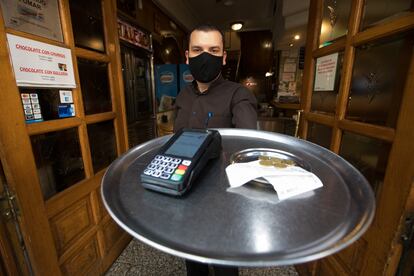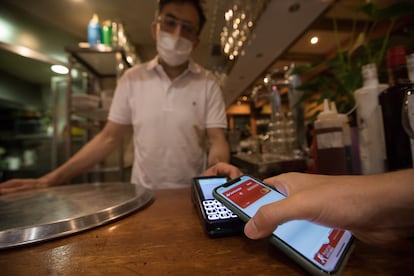Spaniards ditch cash for card payments, but are still leaving tips
The coronavirus health crisis has prompted patrons to use more plastic in bars and restaurants, but only a slight fall has been seen in the gratuities they leave behind

Eduardo and his credit card terminal have been joined at the hip over the last year. Before the coronavirus pandemic took our world by storm, it was only the odd customer who paid with plastic at the Cantalejo bar in La Latina district of Madrid, where he works as a waiter. But, as in so many other sectors, the health crisis has changed the way Spaniards consume. And the vast majority of them are less attached to cash these days. “Now I always carry my credit card machine with me so I don’t have to make two trips,” he says.
Everything suggests this new trend is here to stay. Initially, the introduction of card payments seemed to threaten the practice of tipping, which in Spain often consists of leaving the coins left over from payment of the check. However, the industry says that consumers have adapted, and there has only been a slight decline in this appreciative gesture that bumps up the salary of those employed in the hospitality industry. “It is becoming increasingly common to leave a tip when paying by card,” says Emilio Gallego, general secretary of Hostelería de España – an employers’ association in the hospitality sector – who says that tips have gone down by just 10% in recent months, according to an internal survey.
If 41% of Spaniards used a card to pay on a regular basis in 2019, that figure rose to 54% in 2020
David Fernández, owner of the Asturian restaurant Paixariños in Madrid, says that eight out of 10 customers now pay by card, something that only happened every now and then prior to the pandemic. But he does not believe that this new trend is the death knell for the tip. “Maybe it’s because we work the sidewalk tables a lot nowadays, but people leave even more.” He does add, however, that those who used to leave a very small tip now leave hardly anything at all. “It’s the perfect excuse; they never bring any loose change,” he says. Eduardo, from Cantalejos, holds a similar view: “Card payments have gone up a lot, but we don’t see tips going down. What is very common is that they ask if they can include the tip in the card payment because they think my boss might keep it.”
The Bank of Spain confirms that payments have become digitized on the back of the pandemic. If 41% of Spaniards used a card to pay on a regular basis in 2019 and 53% paid in cash, that figure rose to 54% in 2020 with 36% continuing with cash. In the case of retail and hospitality, the drop in cash payments was even greater; 70% of customers used a card in 2020, and 69% plan to continue using it.

The bank’s cash use report also reveals that hygiene was behind only 2.5% of the population’s suspension of cash use during the pandemic. The vast majority switched to cards because half of the establishments in Spain promoted the use of alternative payment methods. The Spanish Banking Association (AEB) puts the increase in the sale of card readers at 9% in the last year.
The digitalization of consumption has also boosted micropayment applications, such as Bizum, which is now commonly used in the hospitality industry because it allows each diner to transfer their share of the bill to the person who has paid it without commission. In the first half of the year, Bizum had already recorded more transactions than in the whole of 2020 and they expect to reach 450 million transactions by December, compared to 212 million last year.
According to Fernando Rodríguez, Bizum’s head of business development, the next step for the app is for customers to be able to pay restaurants and stores directly via Bizum. “Our idea is to combat cash,” he says.
Commissions of 2%
Bizum is owned by 20 or so large Spanish banks, and its goal of doing away with cash altogether indicates that these firms are the ones benefiting most from digitalization. The average rate applied in 2020 to each card payment was 0.35%, according to the Bank of Spain – an accumulated cost to businesses of €562 million.
In the hospitality industry, the rate is much higher – around 2%, according to Miguel Alonso, owner of the restaurant La Bodeguita del Arte, opposite El Retiro Park in Madrid. “The increase in card payments is a financial blow for me,” he says. “It seems like a small percentage, but if you bill €600 a day we are talking about more than €4,000 a year.”
The pandemic has also kickstarted other trends that facilitate consumption, such as the use of contactless payments, which has increased by 45% during the pandemic, according to the consulting firm Gfk. Also gaining ground is the use of cellphones for payment, which is already the favorite option for 12% of consumers, according to a survey by Spanish fintech Pecunpay.
Those working in the hospitality industry agree that foreigners are the best tippers, and the fall in tourism triggered by the outbreak of the virus has reduced this perk for waiters. But, according to Emilio Gallego, the tradition of tipping has been in decline for years. “It is true that in Spain, tips are becoming less and less important, especially compared to other countries,” he says. “Nowadays, the tip is nothing more than a small bonus, but not an important part of employees’ wages.”
English version by Heather Galloway.
Tu suscripción se está usando en otro dispositivo
¿Quieres añadir otro usuario a tu suscripción?
Si continúas leyendo en este dispositivo, no se podrá leer en el otro.
FlechaTu suscripción se está usando en otro dispositivo y solo puedes acceder a EL PAÍS desde un dispositivo a la vez.
Si quieres compartir tu cuenta, cambia tu suscripción a la modalidad Premium, así podrás añadir otro usuario. Cada uno accederá con su propia cuenta de email, lo que os permitirá personalizar vuestra experiencia en EL PAÍS.
¿Tienes una suscripción de empresa? Accede aquí para contratar más cuentas.
En el caso de no saber quién está usando tu cuenta, te recomendamos cambiar tu contraseña aquí.
Si decides continuar compartiendo tu cuenta, este mensaje se mostrará en tu dispositivo y en el de la otra persona que está usando tu cuenta de forma indefinida, afectando a tu experiencia de lectura. Puedes consultar aquí los términos y condiciones de la suscripción digital.








































